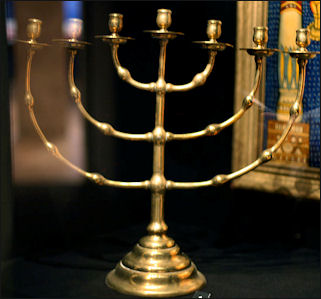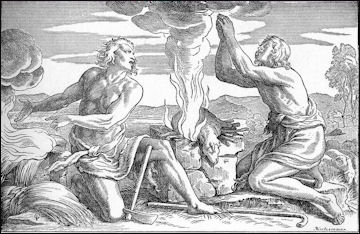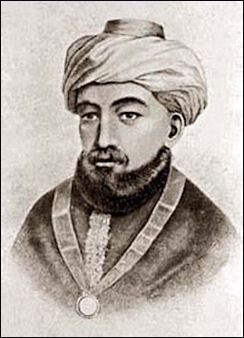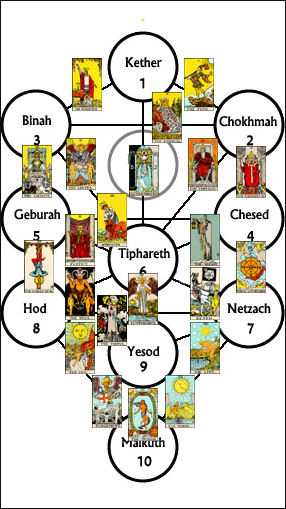Home | Category: Judaism Beliefs
JUDAISM BELIEFS

Sabbath lamp Basic beliefs of Judaism: 1) Existence in one God (Monotheism); 2) Covenant with Israel; 3) Revelation of Torah; 4) Obedience to God s Law; 5) Historical Providence; 6) Redemption. 7) The soul (nefesh) of the deceased is thought to return to God; 8) Accuracy of the Hebrew Bible; 8) belief in the Prophets; 9) Belief that a messiah will come; and 10) belief in the last judgment and resurrection.. [Source: BBC |::|; Encyclopedia.com]
Jews believe that: 1) God is creator and absolute ruler of the universe, and there is only one all powerful god. 2) Man has free will, he is not inherently sinful, and he has the ability to choose between good and evil, and even choose to rebel against God. 3) The Jewish people have a special relationship with God because he revealed the “Torah” to them at Mt. Sinai. By obeying God's law they will be a special witness of God's mercy. 4) God communicates with humanity through revelation and humanity speaks to God through prayer. 5) The laws of God are written in the Torah. 6) The creation of God's kingdom on earth will be heralded the coming the Messiah. 7) There will be a physical resurrection of the dead and immortality. 8) The worship of God is something that arises out of love not fear. 9) The belief that early patriarchs were considered the fathers of Jews. 10) All men are equal in the sight of God.
Paul Mendes-Flohr wrote in the Worldmark Encyclopedia of Religious Practices:Principally a way of life, Judaism emphasizes religious practices rather than articles of faith. Upon his descent from Mount Sinai, Moses explained to the Children of Israel, "And now, O Israel, what does God demand of you? Only this: to revere the Lord your God, to walk only in His paths, to love Him, and to serve the Lord your God with all your heart and soul, keeping the Lord's commandments and laws, which I enjoin upon you today …" (Deut. 10:12–13). Judaism thus began not with an affirmation of faith but with an acceptance of what the rabbis came to call "the yoke of the Torah." Even the Ten Commandments stress basic duties rather than principles of faith. Implicit in the Torah and its teachings are, of course, fundamental beliefs, for example, the belief in God as recorded in the declaration "Hear, O Israel, the Lord is our God, the Lord is One" (Deut. 6:4), which is incorporated into the morning and evening prayers. [Source: Paul Mendes-Flohr Worldmark Encyclopedia of Religious Practices, 2000s, Encyclopedia.com]
In Judaism heresy is thus defined as denial of the existence of God and of his oneness. Nonetheless, the rabbis did not formulate a binding statement of Judaism's principles of faith.
Websites and Resources: Virtual Jewish Library jewishvirtuallibrary.org/index ; Judaism101 jewfaq.org ; torah.org torah.org ; Chabad,org chabad.org/library/bible ; BBC - Religion: Judaism bbc.co.uk/religion/religions/judaism ; Encyclopædia Britannica, britannica.com/topic/Judaism; Yivo Institute of Jewish Research yivoinstitute.org ; Internet Jewish History Sourcebook sourcebooks.fordham.edu ; Aish.com aish.com ; Jewish Museum London jewishmuseum.org.uk
RECOMMENDED BOOKS:
“Essential Judaism: Updated Edition: A Complete Guide to Beliefs, Customs & Rituals”
by George Robinson Amazon.com ;
“Guide for the Perplexed” by Moses Maimonides, Andrea Giordani, et al. Amazon.com ;
“Living Judaism: The Complete Guide to Jewish Belief, Tradition, and Practice”
by Wayne D. Dosick Amazon.com ;
“Judaism: History, Belief and Practice” by Dan Cohn-Sherbok Amazon.com ;
“The Origins of Judaism: An Archaeological-Historical Reappraisal” by Yonatan Adler Amazon.com ;
Early Judaism: A Comprehensive Overview by John J. Collins and Daniel C. Harlow Amazon.com ;
“Living a Jewish Life: Jewish Traditions, Customs, and Values for Today's Families” by Anita Diamant, Howard Cooper, et al. Amazon.com ;
“Choosing a Jewish Life, Revised and Updated: A Handbook for People Converting to Judaism and for Their Family and Friends” by Anita Diamant, Barrie Kreinik, et al. Amazon.com ;
“To Be a Jew Today: A New Guide to God, Israel, and the Jewish People”
by Noah Feldman Amazon.com ;
“A History of the Jews” by Paul Johnson, Amazon.com
Covenant, the Chosen People Israel and the Rabbanite Tradition

Cain and Abel The Jews believe that they have a special covenant (promise with God) and are his Chosen People. The title of Chosen People does not connote a position of superiority rather it means they have the responsibility of passing on their knowledge about the one true God to other peoples of the world.
Israel as an idea and a place holds a special meaning among Jews and it was bound with other beliefs. Louis Jacobs wrote in the Encyclopaedia Judaica: Israel, it was taught, had been chosen to be a light unto the nations (Isa. 42:6; 49:6) and to be God's special treasure (Ex. 19:5). But both universalism and particularism are found in the Bible, with all the tensions inseparable from belief in God as Father and King of all men and belief in His special concern with Israel. This people were to lead lives of absolute faithfulness to God. The greatest sin they could, and did, commit was idolatry. [Source: Louis Jacobs, Encyclopaedia Judaica, 1990s, Encyclopedia.com]
The vast majority of Jews are Rabbanites. the alternative, the Karaites are a very small minority (See Karaites). The Rabbinites trace their origins back to the Pharisees of Judea, during the Maccabeean and Roman periods. The Pharisees and their successors developed a tradition of interpretations of the laws of Moses which became codices in the Talmudic literature. Many features of contemporary Judaism — including the substitution of fines and payments of compensation for body mutilations to enforce “lex taliois” , lighting of candles to begin the Sabbath and holidays, the Seder ceremony to mark Passover, the Hebrew prayer book and Talmudic study and argumentation — stem from the Rabbanite tradition.
The Temple in Jerusalem that was destroyed in A.D. 70 by the Romans is also very important. It is mentioned extensively in Orthodox services. Conservative Judaism mentions the Temple and its restoration, but not its sacrifices. The destruction of the Temple is mourned on the Jewish fast day of Tisha B'Av. Due to religious restrictions on entering the most sacred areas of the Temple Mount, the Western Wall, a retaining wall of the Temple Mount and remnant of the Second Temple structure, is considered by some rabbinical authorities the holiest accessible site for Jews to pray. When The Third Temple is built here in the future, it is said, it will signal the coming of the Messiah.
Thirteen Principals of Maimonides
Numerous efforts have been made to crystalize the core beliefs of Judaism. Few of these efforts have been accepted by all Jews. Many Jews, however, accept the Thirteen Principals of Judaism as outlined by Maimonides, one of the great scholars in Jewish history. [Source: Encyclopedia.com]
The Thirteen Principles (Thirteen Articles of Faith) of Maimonides are regarded as the basic dogma of Judaism. They are: 1) The existence of God, the Creator of All Things; 2) His absolute unity; 3) His incorporeality; 4) His eternity; 5) The obligation to serve and worship him alone; 6) The existence of prophecy; 7) The superiority of the Prophecy of Moses above all others; 8) The “Torah” is God’s revelation to Moses; 9) “The Torah” is immutable; 10) God’s omniscience and foreknowledge; 11) Rewards and punishments according to one’s deeds; 12) The coming of the Messiah; 13) The resurrection of the dead.

Maimonides Paul Mendes-Flohr wrote in the Worldmark Encyclopedia of Religious Practices:These principles were incorporated into the prayer book as the hymn "Yigdal" ("May He be magnified … "), which in 1517 was supplemented by a more elaborate prose explication in the form of a personal attestation of belief ("I believe in perfect faith …"). With their inclusion in the traditional liturgy, the "Thirteen Principles" thus gained the status of an official catechism. Maimonides even went so far as to claim that anyone not subscribing to all of the principles of faith, even if the person observes the laws of Moses, will not have a share in the world to come. To underscore the overarching significance he attached to the principles, Maimonides held that an utter sinner, although he or she will be appropriately punished, will share in the world to come if the principles are affirmed. [Source: Paul Mendes-Flohr Worldmark Encyclopedia of Religious Practices, 2000s, Encyclopedia.com]
For Maimonides, then, a Jew is defined by what he believes and not by what he does, which amounted to a radical revision of Judaism. It is, therefore, not surprising that many rabbis and philosophers disputed the authority of the "Thirteen Principles," contending that they were not as basic and essential as Maimonides contended. For instance, the Spanish philosopher Yosef Albo (c. 1380–1444) argued that there are only three basic doctrines constitutive of Jewish belief: the existence of God, divine revelation, and divine reward and punishment. Another Spanish philosopher and biblical scholar, Isaac Abravanel (1437–1508), questioned whether it was necessary at all to formulate articles of belief. To his mind the faith implicit in the observance of the Torah was sufficient. He concluded nonetheless that Maimonides' "Thirteen Principles," although not to be construed as dogma, might be helpful for those unable to comprehend on their own the theological presuppositions of the Torah and its commandments. [Source: Paul Mendes-Flohr Worldmark Encyclopedia of Religious Practices, 2000s, Encyclopedia.com]
Although Maimonides' "Thirteen Principles" as formulated in the liturgy are still affirmed by Orthodox and Conservative Jews, they are subject to interpretation. Reform Jews have periodically formulated alternative statements of the essential Jewish beliefs, but by and large they continue to endorse the first five, namely, the existence of God, that he is one, that he has no bodily form, that he is eternal, and that he alone is to be worshiped.
Jewish Beliefs About God
Jews believe that there is a single God who not only created the universe, but with whom every Jew can have an individual and personal relationship. They believe that God continues to work in the world, affecting everything that people do. The Jewish relationship with God is a covenant relationship. In exchange for the many good deeds that God has done and continues to do for the Jewish People. The Jews keep God's laws. The Jews seek to bring holiness into every aspect of their lives. [Source: BBC |::|]
A summary of what Jews believe about God: 1) God exists; 2) There is only one God; 3) There are no other gods; 4) God can't be subdivided into different persons (unlike the Christian view of God); 5) Jews should worship only the one God; 6) God is Transcendent: God is above and beyond all earthly things; 7) God doesn't have a body; 8) Which means that God is neither female nor male; 9) God created the universe without help; 10) God is omnipresent; 11) God is everywhere, all the time; 12) God is omnipotent; 13) God can do anything at all; 14) God is beyond time; 15) God has always existed; 16) God will always exist; 17) God is just, but God is also merciful; 18) God punishes the bad; 19) God rewards the good; 20) God is forgiving towards those who mess things up; 21) God is personal and accessible; 22) God is interested in each individual; 23) God listens to each individual; 24 ) God sometimes speaks to individuals, but in unexpected ways. |::|
See Separate Article: GOD AND JUDAISM africame.factsanddetails.com
Jewish Ideas About Salvation and End of the World

Kabbalah Tree of Life 1) Jews have no special views on the afterlife. 2) The believe in living a good life in this world and performing good deeds that will help in the here and now not the hereafter. 3) Jews have no concept of original sin and salvation. 4) The concept of righteousness is important. A good Jew, or righteous Jew, is one who fulfills his duties with a full heart and incorporates Jewish laws, ethics and morality into his or her everyday life. “Without the Temple there is no way to fulfill many of the religious obligations such as ritual sacrifices, that the Torah requires. In Orthodox theology, that means that all Jews are stuck in a state of impurity, and are therefore unable to be in the presence of God."
For Jews the equivalent of salvation is “t’shwa” , turning towards God. For Christians salvation combines redemption and the revelation of God. For Jews the are two distinct things: the emphasis has traditionally been placed on redeeming oneself in this life with revelation coming in the end. Man’s duty is to listen and follow God. Speculating about the hereafter are regarded as a distraction that keep one from one’s duties.
The Talmudic scholar Jacob Neusner told Newsweek, “The Torah teaches that the kingdom that matters is not in heaven, but the one we find ourselves in now: sustaining life, sanctifying life, in the here and the now of home and family, community and society.”
Jews, Christians and Muslims all have end of the world scenarios foretold by natural disasters and other calamities and feature the accession to heaven by the faithful or something similar. Hindus and Buddhist read life as cyclical and they have no end of the world scenarios.
Jewish end of the world scenarios are closely tied with the coming of the Messiah, who according to the medieval philosopher Maimodnides, will be a great leader who will preside over Israel for a thousand years. Mystics view the period as time when "flesh will no longer exist and there will be pure spiritual reality."
Miracles, Superstitions and Dogs in Judaism
There is a tradition of astrology within Judaism. Each zodiac sign is associated with a month on the Jewish calendar, one of the 12 tribes of Israel and the 12 organs of the body. Jews have also traditionally been afraid of magical knots. They tying of knots was forbidden on the Sabbath. See Kabbalah
For Jews and Christians, miracles serve principally as signs of God’s power. Orthodox Jews view life itself as a miracle. In the Old Testament the first miracles were performed by God. Later they were performed mainly by the Prophets such as Moses, Elijah and Elisha, who use them sparingly, often to make a specific point. In the ultra-Orthodox community there are holy men and faith healers. Among some Jewish groups you can find gatherings of worshipers, chanting, singing, thumping finger tambourines and lighting candles waiting to touch revered rabbis who claim to cure people of cancer and raised crippled people from their wheelchairs.

Joshua Commands the Sun to Stand Still,
an Old Testament (Torah) miracle
Chabad-Lubavitch is a Hasidic Branch of Judaism with Kabbalist roots. Founded in Belarus in the 18th century and is now based in Brooklyn, it has 3,000 organizations in 75 countries whose goal is to prepare their host cities for the coming of the Messiah. Lubavitchers are named after Lubavichy, a town near Smolensk, Russia, where the movement was based from 1813 to 1915. Many of its followers believe that Menachem Mendel Schneerson, who died in Brooklyn in 1994 and was the seventh and last leader of the group, was the Messiah or kind of pre-Messiah. Among other things Schneerson encouraged parents to put blessings such as psalms in the cribs of newborn infants.
A number of miracles have been attributed to Schneerson. In July 1992, for example, the daughter of a woman diagnosed with stomach cancer asked Schneerson for a blessing and was told to put mezuzas through her house, light Shabbis candles and perform good deeds. The mother did all things. Three days later when a biopsy was performed no cancer was found. Her doctor said, “Someone's prayers were answered." Schneerson's office receives more than 1,000 letters day requesting blessings.
Dogs are not mentioned in a very positive light in The Bible. Candida Moss wrote in the Daily Beast: The biblical book of Proverbs says that the fools act like dogs that return to their own vomit (26:11). Rabbinic sources agree and stress that the animal appears to feel no shame as it rehearse its mistakes over and over. The biblical Queen Jezebel met her end when she was pushed out of a window and her body consumed by dogs in the space of a few hours (2 Kings 9:35-37). A character in the apocryphal story the Acts of Andrew hopes that dogs will eat the saint Andrew alive as he hung from his cross. In such contexts stray dogs are scavengers who feed on the bodies of the condemned. [Source: Candida Moss, Daily Beast, January 16, 2022]
See Separate Article: RABBIS WITH SPECIAL POWERS africame.factsanddetails.com
Image Sources: Wikimedia Commons Text Sources: Internet Jewish History Sourcebook sourcebooks.fordham.edu “World Religions” edited by Geoffrey Parrinder (Facts on File Publications, New York); “ Encyclopedia of the World’s Religions” edited by R.C. Zaehner (Barnes & Noble Books, 1959); “Old Testament Life and Literature” by Gerald A. Larue, New International Version (NIV) of The Bible, biblegateway.com; Wikipedia, National Geographic, BBC, New York Times, Washington Post, Los Angeles Times, Smithsonian magazine, Times of London, Library of Congress, The New Yorker, Reuters, AP, AFP, Lonely Planet Guides, and various books and other publications.
Last updated March 2024
